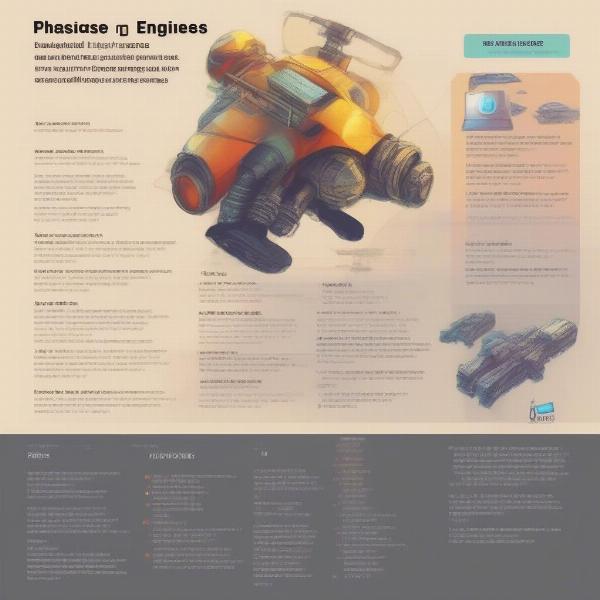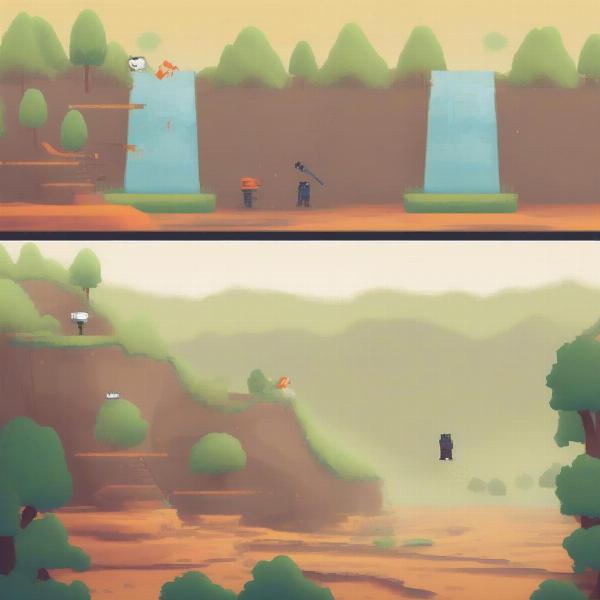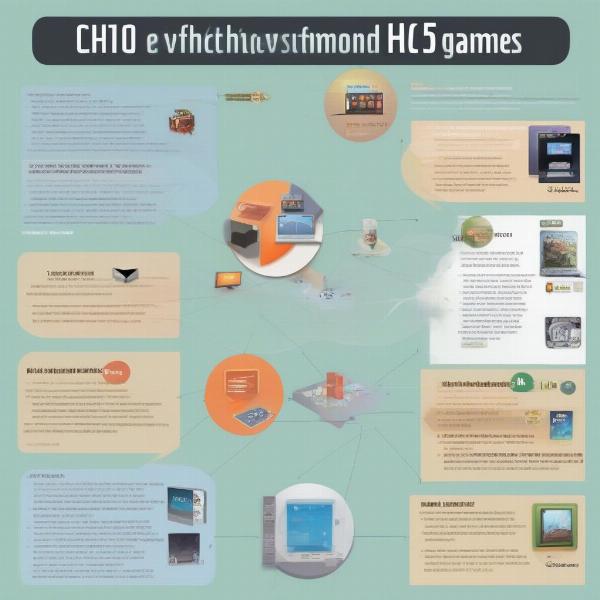Developing games using HTML5 offers an accessible entry point into the world of game development. It leverages widely understood web technologies, enabling creators to reach a vast audience across various devices. Whether you’re a seasoned programmer or just starting out, this comprehensive guide will equip you with the knowledge and resources you need to build your own HTML5 games.
Similar to how you can access many games directly in your browser, HTML5 allows for seamless gameplay across different platforms. This guide will delve into the core components of HTML5 game development, from choosing the right game engine to optimizing performance and publishing your finished creation. Let’s dive into the exciting world of building HTML5 games.
Choosing the Right Game Engine
Selecting an appropriate game engine is a crucial first step. Several excellent options cater to varying skill levels and project complexities. Phaser, for instance, provides a robust and beginner-friendly framework, while PixiJS offers more granular control over rendering for advanced developers. Other popular choices include Babylon.js for 3D games and Construct for visual, no-code game creation. Consider factors like your coding proficiency, desired game genre, and performance requirements when making your decision. Choosing the right engine can significantly streamline your development process.
What engine should I use for my first HTML5 game? For beginners, Phaser offers an excellent balance of ease of use and powerful features.
 Selecting the Right HTML5 Game Engine for Your Project
Selecting the Right HTML5 Game Engine for Your Project
Mastering the Fundamentals: HTML5, CSS3, and JavaScript
A solid understanding of core web technologies is essential for building HTML5 games. HTML5 provides the structural foundation, CSS3 styles the visuals, and JavaScript brings the game logic to life. While game engines often abstract away some of the complexities, knowing how these technologies interact is crucial for debugging, optimization, and extending functionality. Learning these fundamentals will solidify your game development skills.
How do HTML5, CSS3, and JavaScript work together in game development? HTML5 structures the game elements, CSS3 styles their appearance, and JavaScript handles the game’s logic and interactivity.
Building Your First Game: A Step-by-Step Approach
Let’s build a simple game to illustrate the process. We’ll create a basic “catch the falling objects” game using Phaser. First, set up your development environment with a code editor and a local web server. Next, initialize a Phaser project and create the game canvas. Then, add game assets, such as images and sounds, and implement the game logic using JavaScript. Finally, test and refine your game for optimal performance and user experience.
How do I start building an HTML5 game? Begin by setting up your development environment, choosing a game engine, and creating a simple game project. Consider exploring how to play browser games on android for further inspiration. how to play browser games on android
 Step-by-Step Guide to Building Your First HTML5 Game
Step-by-Step Guide to Building Your First HTML5 Game
Optimizing Performance for Smooth Gameplay
Performance optimization is vital for ensuring a smooth and enjoyable gaming experience. Several techniques can enhance your game’s performance, such as minimizing draw calls, optimizing asset sizes, and employing efficient coding practices. Consider using tools like the Chrome DevTools profiler to identify performance bottlenecks and optimize accordingly. Optimizing your game will greatly improve its playability.
What are some common performance optimization techniques for HTML5 games? Techniques include minimizing draw calls, optimizing asset sizes, and employing efficient coding practices.
Publishing and Sharing Your HTML5 Game
Once your game is ready, you can easily publish it online and share it with the world. Platforms like itch.io and Game Jolt provide convenient ways to host and distribute your game. You can also embed your game directly onto your website or blog using an iframe. Sharing your game is an exciting step in the development process.
Where can I publish my HTML5 game? Platforms like itch.io and Game Jolt offer convenient ways to host and distribute your HTML5 games.
 Sharing Your HTML5 Game with the World: Publishing Platforms and Techniques
Sharing Your HTML5 Game with the World: Publishing Platforms and Techniques
Advanced Techniques: Implementing Multiplayer and Physics
For those seeking to elevate their game development skills, exploring advanced techniques like multiplayer functionality and physics engines can add depth and complexity to your projects. Libraries like Socket.IO can facilitate real-time multiplayer interactions, while physics engines like Box2D and Matter.js provide realistic physics simulations. These advanced techniques can elevate your games to the next level.
What are some advanced HTML5 game development techniques? Implementing multiplayer features and integrating physics engines can enhance game complexity and interactivity.
Conclusion
Building HTML5 games offers a rewarding journey into the world of game development. By understanding the core technologies, choosing the right tools, and following best practices, you can bring your creative visions to life. From simple games to complex interactive experiences, HTML5 empowers you to build and share your creations with a vast online audience. Start building your own HTML5 game today and explore the limitless possibilities of web-based gaming. How To Build Html5 Games becomes an achievable goal with the right guidance and resources.
FAQ
-
What is the easiest way to learn how to build HTML5 games? Starting with a beginner-friendly game engine like Phaser is a great approach.
-
Do I need to know how to code to build HTML5 games? While coding knowledge is helpful, visual game development tools like Construct allow you to create games without writing code.
-
How long does it take to build an HTML5 game? The development time varies depending on the complexity of the game, but simple games can be created in a relatively short amount of time.
-
Can I monetize my HTML5 game? Yes, you can monetize your HTML5 games through various methods like in-game advertising and in-app purchases.
-
What are some good resources for learning more about HTML5 game development? Online tutorials, documentation for game engines, and online communities are excellent resources for expanding your knowledge.
-
Are HTML5 games compatible with mobile devices? Yes, one of the advantages of HTML5 games is their cross-platform compatibility, including mobile devices.
-
What are some examples of popular HTML5 games? There are many successful HTML5 games available online, showcasing the capabilities of this technology.

